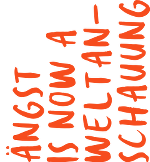Kinga Tóth | HUN/DEU Autorin, Sprachwissenschaftlerin, (Klang-)Poet-Illustratorin und Kulturmanagerin | geb. 1983 in Sárvár, Ungarn. Ihre Texte inszeniert sie mit Performance und Installationen. Sie erhielt u.a. das Eduard-Rosenthal Stipendium GEDOK und den Hazai Attila Preis für Literatur. Zu ihren Publikationen zählen Gedichtbände (auf Ungarisch, Deutsch und Englisch) mit Illustrationen: u.a. »ALL MACHINE/Allmaschine« (Edition Solitude, Magvető), »Wir bauen eine Stadt« (parasitenpresse), „Mondgesichter“ (Magvető 2017). www.tothkinga.blogspot.de
DON’T SHIVER
I often view my country as a Sunday lunch scenario, a family dinner, a party, where you can move, talk – but only if you have the permission to do so. There is an order even in the placement, your seat shows your role, your borders. The movements follow the rules, the repetitive activities refer to the old-new tales and superstitions, but they won’t bring peace and calmness, they are meaningless. A story of a country, the big Mutterlandfamily, a system, where rules are changing, where you never know, whether you are in or out, whether you have power or not, whether you are aggressor or victim, where it is a risk to talk, to use the language, but where silence is dangerous as well. The words are propaganda-painted, or vanished – especially if they are in connection with sharp and serious social and political problems, such as domestic violence, aggression, poverty, racism, LGBT, tradition and rules and education. These are the taboo ones, on a never ending Sunday lunch we do not put unwanted topics like that on the table.
But if we are not able to swallow (any more), which is a relevant problem at the moment, for example in the Hungarian art field, where the act of making art is often t a political act, how can we cook in a different way? Which methods should we use to apply power? Is it a good strategy to handle it in the same aggression-powertaking way, or do we need to create a new language, e.g. a language of codes, which are still “clean” from multiple meanings and manipulation? – Especially if we want to do this internationally? Or should we use language in a „wrong way“, turn it upside-down, empty it or widen it and create “hybrid-monsters” with a “frightening” humor?
I tried both: I wrote a book in another language, used some traditional words, but also a code-system. During a performance I then created a huge blue and tidy woman, who sang about the taboo – but in the form of a folk song and a folk dance (or movements like washing); the national melody and the traditional movement “transported” the unspeakable into the mind (first), barely perceptible - to turn it into a demonstration, into a counteraction. Similar methods can be found in projects by Kriszta Nagy Tereskova (HUN) and also by Kundy Crew in Slovakia (political art group – working with traditional splash guards (used to be in the kitchen, a white cloth, with a message for the “good women”, good advices sewed with a red thread). They have exhibitions all around Europe and also started a campaign. This movement has also become a „trend“ in other countries: female rights and facts about sexism are sewn with a red thread, to create current messages with a traditional form/method.) Practicing sports with the fence and by the border (with Sonja Hornung, Graz, 2018) could also empower a potential object of power – in terms of building something bigger, filling it up with air until it becomes huge — with air, laugher, humor and then BOOM! (?) At least, DON’T SHIVER!
